How does Westminster chaos affect Scottish debate?
- Published
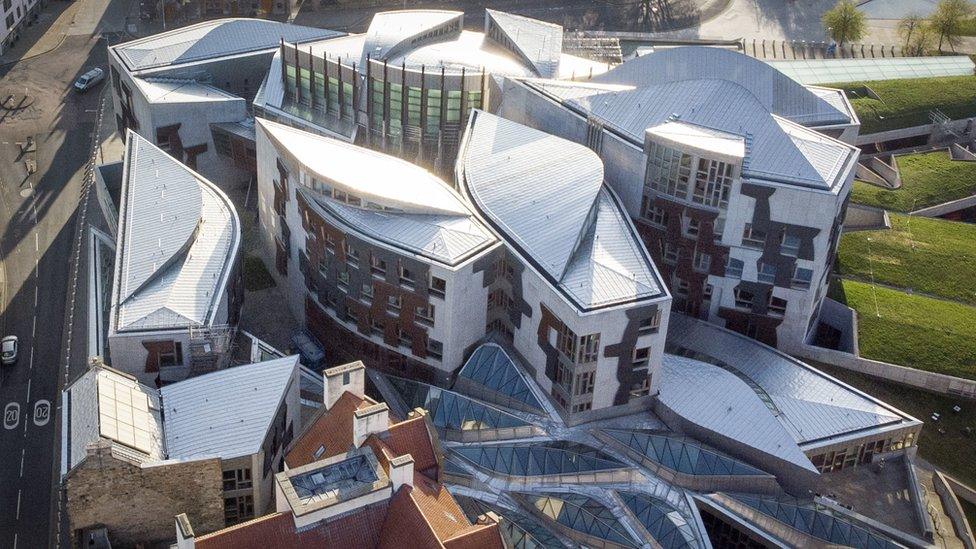
The UK is set for its third prime minister in the space of three months, with Westminster again gripped by political turbulence. With Holyrood about to come back from its October holidays, how does the debate impact on parties in Scotland?

Popcorn supplies may have run low in the households of most MSPs over the last couple of days, as they watched the Conservative UK government implode again.
To an extent, devolved politics can drift serenely on - Holyrood has been in recess for the past fortnight, and has normal business scheduled for the coming week.
Indeed, it has its own rows to focus on, with legislation to reform the Gender Recognition Act set for its first full debate on Thursday.
MSPs have also been promised a statement from Deputy First Minister John Swinney about an emergency budget review, with inflation ripping a hole in the government's budgets.
But many may still struggle to tear their eyes away from the drama unfolding at Downing Street, which could have huge implications for every party.
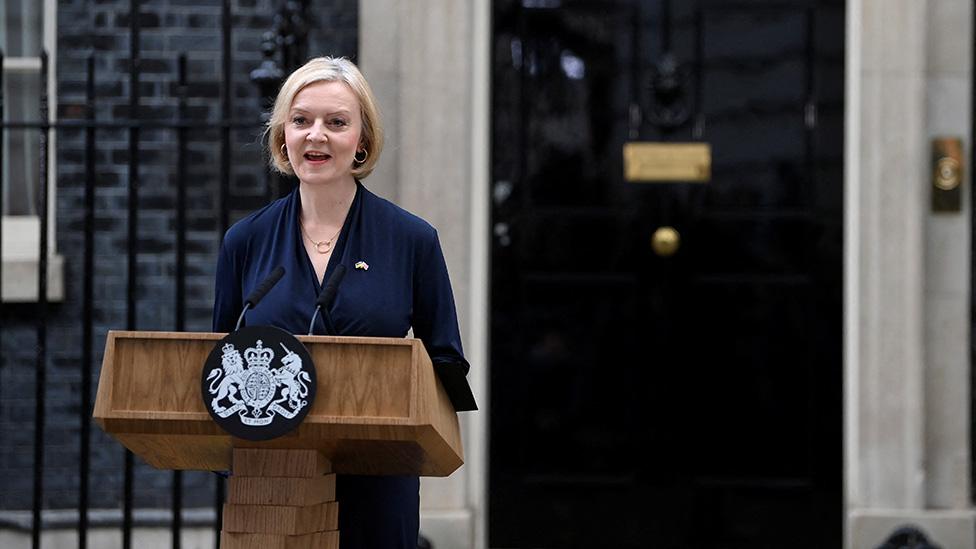
Liz Truss announced her resignation outside 10 Downing Street, 44 days after she arrived
Scottish Tory MSPs are in a somewhat sheepish mood at the moment - tinged with frustration at the ever-deepening crisis in the UK party.
That's particularly true of those who backed Liz Truss. The nine MSPs who penned an article in the Times, external hailing her "bold and ambitious plan for the country and economy" are unlikely to have it framed on the wall.
These are exactly the sort of quotes they don't want to resurface now: "Her serious style of leadership and her ability to deliver results in government are exactly what we need."
Even beyond Ms Truss's direct backers, many are privately annoyed at being sent out to defend UK party policies which were ditched within days, burning their own political capital.
And with Chancellor Jeremy Hunt set to wield the axe on public budgets regardless of who wins, they know there are going to be more tough messages to sell.
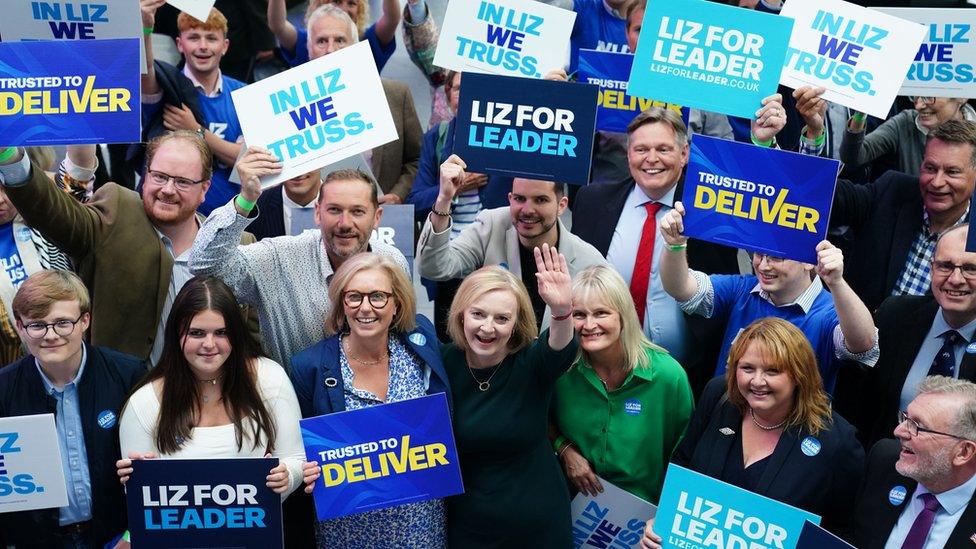
Tory MPs and MSPs are wary about attaching themselves to another candidate, given how it went last time for the winners
Leader Douglas Ross is in a particularly awkward position, and is again refusing to publicly take a side in the latest contest in the hope of fostering good relations with whoever wins.
That would be extremely difficult if the new prime minister turns out to be the old prime minister, with the return of Boris Johnson - the nightmare outcome for Mr Ross, and indeed the bulk of Scottish Tories.
Almost all of the Holyrood group jumped in behind Mr Ross when he called on Mr Johnson to resign in the wake of the "partygate" row.
His subsequent u-turns on that prompted questions about his own future, so it is difficult to see how he could take yet another position by welcoming Mr Johnson back with open arms.
Nicola Sturgeon said the resignation of Liz Truss was "beyond parody"
The question every non-Conservative politician in Scotland has been asking is why this should just be a choice for the 172,000 Tory members - why not let the nation choose in a general election?
First Minister Nicola Sturgeon says it's a "democratic imperative". Labour are also keen to paint themselves as a "government in waiting".
The immediate barrier to that is the survival instinct of Conservative MPs, who are looking at Armageddon-level polling. The party is in an extremely vulnerable state, and turkeys are rarely keen to vote for a Christmas election.
All six Scottish Tory seats would be considered marginal - with majorities under 10% - so really none of them would feel confident of keeping their jobs.
But you can't rule an election out, because the Conservative Party has demonstrated a real knack in recent months for blowing itself up.
Discipline is a forgotten concept and Mr Johnson returning to No 10 may be the final straw for an already fractured party. Things could fall apart quite easily were that to happen.
Equally, the new prime minister might feel the best way to stabilise things is to promise to go back to the country sometime next year, placating the public somewhat while providing time to regain ground.
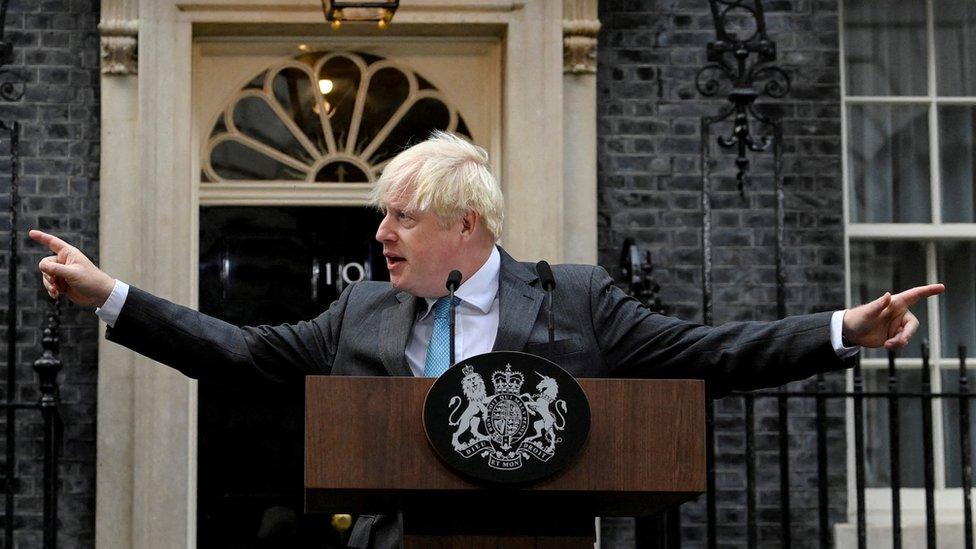
There has been talk of a Boris Johnson comeback, but could the return of a divisive figure blow up the party for good?
Mr Johnson would also be the dream result for the SNP, who absolutely loved campaigning against him.
Many of their digital ads during the UK, Holyrood and council polls of 2019, 2021 and 2022 were literally just a picture of his face.
The party is also in second place in all of the Westminster seats held by the Conservatives, so might be hoping to make gains.
But there is a hint of bigger-picture concern for the SNP in that they have been quite happy for Scottish politics to become a binary contest between themselves and the Tories, as the parties of independence and the union.
If the Conservatives face collapse and people start to see Labour as a realistic government in waiting, that balance could begin to shift.
That's why SNP leadership figures started workshopping attack lines at their recent conference in Aberdeen, seeking to tie Labour to Brexit and decrying Sir Keir Starmer as not being a radical enough alternative to the Tories.
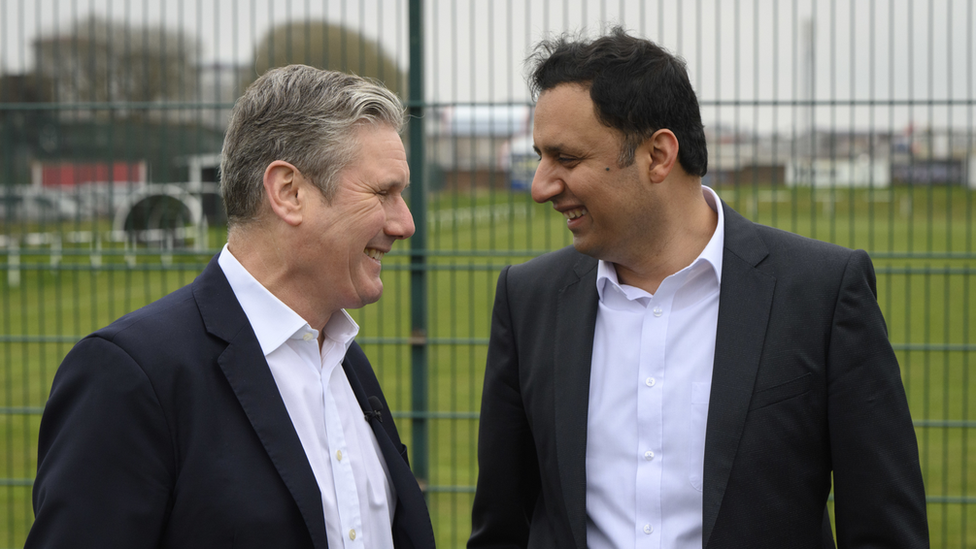
Anas Sarwar hopes Sir Keir Starmer can provide a route back to relevance for Labour north and south of the border
Labour themselves are understandably in buoyant mood, confident that things are moving in their direction.
Having regained second spot from the Conservatives in May's local council elections, the Scottish party hopes it can make further gains as part of a UK-wide movement.
This is not as straightforward as the polls might make it seem even in a general election, as Labour's target seats north of the border are all held by the SNP - which also paints itself as an anti-Tory vote.
There are actually only four marginal seats where Labour is in second place - and three of them technically no longer have SNP MPs, with two having defected to the Alba Party and another losing the whip over a Covid rule breach.
It would take a significant swing from the SNP back to Labour for them to make real progress towards recapturing traditional heartlands in places like Glasgow and Fife.
And of course there can be quite a gulf between being confident that something is going to happen eventually, and actually seeing it delivered.
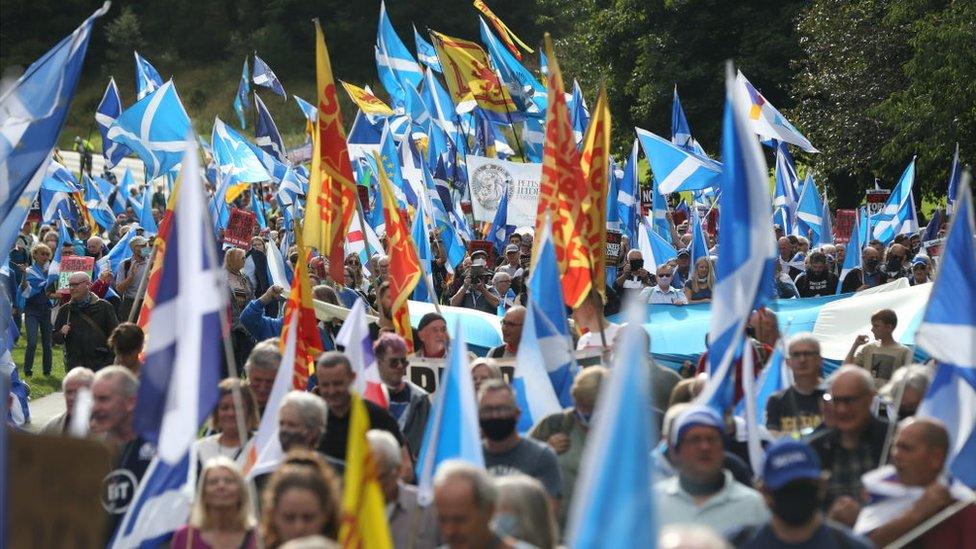
That will be a familiar song for supporters of independence, fresh from talk of the "arc of history" moving in their direction at the SNP conference.
Ongoing chaos at Westminster is obviously helpful to the campaign, with economic uncertainty allowing the Scottish government to paint independence as a lifeboat rather than a gamble.
But deadlock at Downing Street also means there is precisely zero chance of the UK government signing up to a referendum any time soon.
Whoever takes over from Liz Truss will have plenty on their plate trying to calm MPs and the financial markets, without immediately plunging into a career-defining constitutional contest.
Ms Sturgeon really wants a 2014-style agreement to underpin an internationally-recognised referendum, and even her government's argument to the Supreme Court was based on the idea Westminster would ultimately need to deliver the result of a vote.
So while backers of independence will be enjoying this car-crash immensely, it might not bring their dream any closer to being realised.